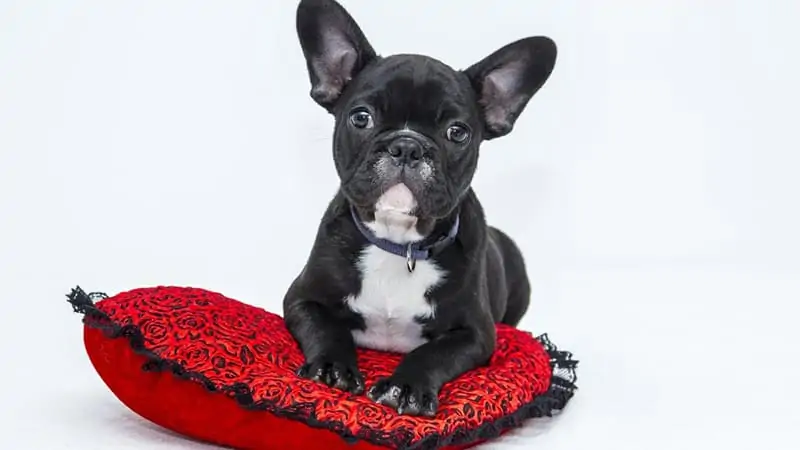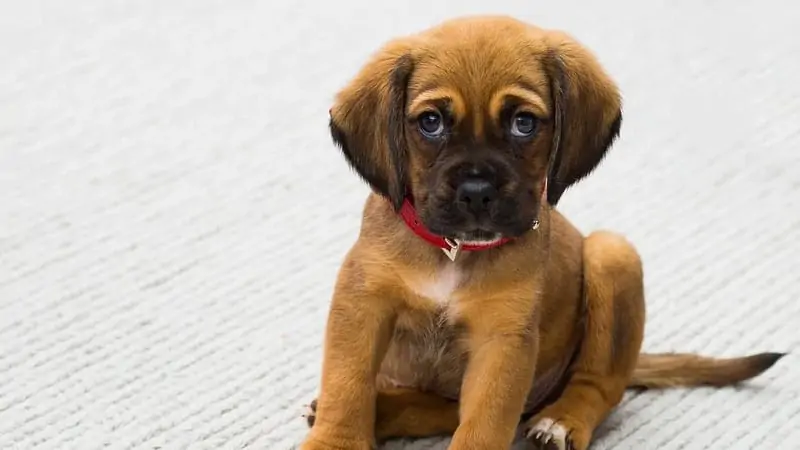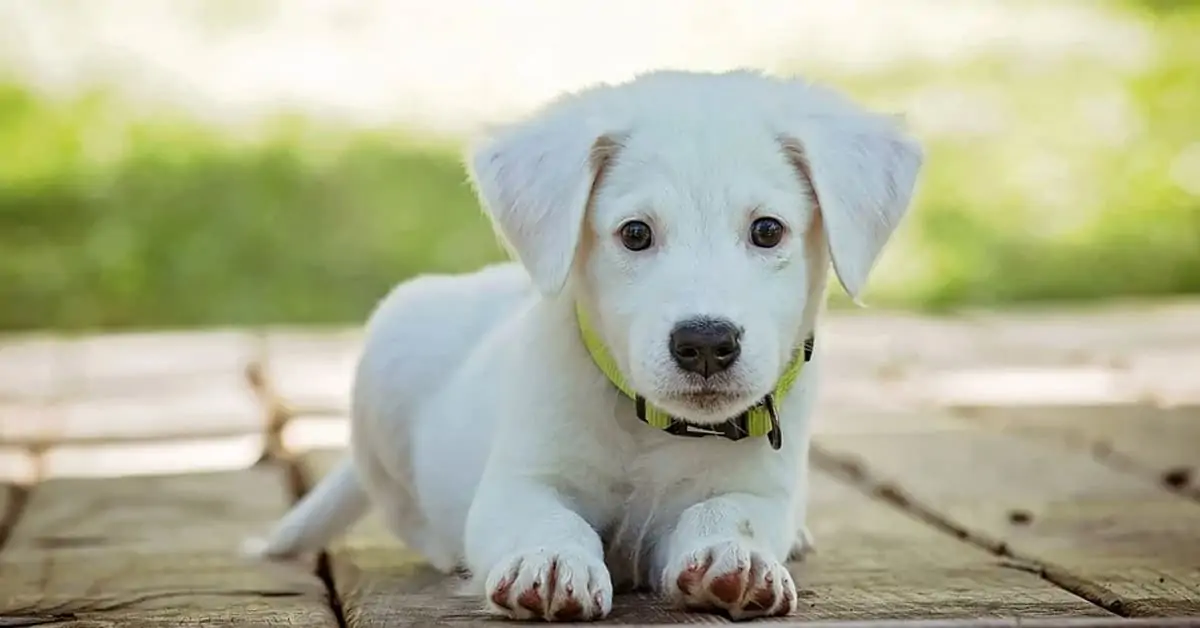Dogs love their human family, especially when they are still young puppies. They crave your company, affection, and attention and would be by your side all day long if it were up to them. When you leave your puppy alone it’s likely it will feel sad and cry.
Most puppies will stop crying within ten minutes after they realize you’re out of earshot. However, if they suffer from separation anxiety they might cry longer. In severe cases, the puppy may cry throughout your absence until you return.
Incessant barking, yelping, and whining can be a cause of disturbance to the neighbors and frustration for the owner. How you react to the crying can have lasting effects on the puppy’s future behavior and temperament.
Is It OK For a Puppy to Cry When Left Alone?

Like human babies, puppies communicate their needs through crying. Some reasons why the puppy is crying when you leave include:
Need for Affection
Puppies need connection and affection. When you leave, they miss your affection and are confused about whether they will get you back.
Loneliness
Dogs are social animals and you are a member of their pack. Puppies can be especially needy because they have just recently been separated from their parents and littermates.
In most cases, the puppy is afraid of being abandoned and wants to be part of everything you do.
Boredom
Puppies are adventurous explorers and they don’t like it when you head out the door without them. They too want to go to the outside world and explore the wonders beyond your front door.
When you leave them behind, they feel you’re leaving them out of an exciting adventure. They want to come with you and chase birds, smell flowers, potty outside the home, step on soft grass, dive in water puddles, and do all the fun stuff it thinks you’ll be doing on your own.
Fear
Your puppy was just born recently and isn’t familiar with the workings of this world. Sharp noises such as door knocks, car hoots, vacuum cleaners, and blaring music scares it.
Strange voices and unfamiliar faces might be an enemy attack. The dog looks up to you to protect it from these potential enemies and intruders. The pup is also worried about who will feed it and give it water if you’re not home.
You leaving means the pup is now defenseless and an easy mark for predators. Crying is then a survival instinct to keep its protector and provider close.
To distinguish whether it’s fear, pay close attention to the pup’s body language. If the tail is down and it’s avoiding eye contact, then it’s telling you that it’s afraid. Some training could work to improve the puppy’s confidence.
Thirst and Hunger
Puppies can sometimes be poor eaters when you’re around yet when you try to leave, they suddenly feel hunger. When you’re around, the puppy could be in a relaxed or playful mood. It’s still young and hasn’t learned to regulate meal times. It needs to be closer to you may override their appetite. However, when you’re leaving, they now realize their provider is leaving.
To curb the crying due to hunger, train your puppy to eat on schedule. You may also fill up their bowl before you leave, but only if they are potty trained.
Need for Exercise
Puppies can be energetic and playful. Every waking moment they want to run around, chase things, play fetch, play tug of war, and sniff or taste everything.
When you leave, they are losing a playmate. They may have lots of pent-up energy which they can now only expend by crying and scratching at the door.
To reduce the chances and duration of the puppy’s crying, engage them in lots of exercise before you leave them. Take them to the dog park or for a walk around the block. They love playing tug of war, which doesn’t need to use too much energy from you. You could just sit on the couch and ‘fight over’ their favorite toy.
Sickness
Frequent crying and whimpering could be a sign that your puppy is ill. Puppies have fragile immune systems and may suffer from allergies, parasites, and infections. Some symptoms to watch out for include:
- Lethargy
- Drooling
- Loss of appetite
- Panting
- Vomiting
- Diarrhea
How Long Will a Puppy Cry When Left Alone?
How you react to your puppy from the first time it cries as you leave will determine how long and often it cries. A well-adjusted puppy will cry for a few minutes the first few times and gradually stop altogether.
A poorly adjusted puppy might suffer separation anxiety and cry for hours at the door or window after you leave. In extreme cases, the puppy will cry until you return, no matter how long it takes.
How Do I Stop My Puppy from Crying When I Leave?

Crying is a natural reaction and most puppies will start out crying when first left on their own. However, with the right training, they can quickly adjust and learn to accept your temporary absence. Some ways to prevent crying and promote a healthy adjustment include:
Don’t Yell
Yelling at a crying puppy will often only increase the crying. Some puppies even prefer the negative attention to being ignored, so your yelling will only reward and reinforce the behavior.
Don’t Punish
Punishing your puppy for crying may make them stop but will ultimately hurt your relationship. The puppy may stop listening to your commands, won’t come when you call and may cower under furniture instead of playing whenever you’re around.
Start With Short Trips
Your puppy probably has a fear that when you leave you won’t come back. When you first get your puppy, plan on having a few days without having to go anywhere.
On those first few days, start by going out without the dog on very short trips. Maybe go out for five minutes to say hi to the neighbor and come back. Make your next trips gradually longer and longer.
As the puppy gets used to the fact that you always return when you leave, they will no longer be anxious about your absence.
Bring Entry Gifts
Whenever you return, make a big fuss about your entry. Shower the puppy with your attention and bring them a tasty treat.
The puppy will associate your return with happy times. They will instinctively understand that you going away means you’re off to hunt and will bring them some goodies.
Exercise
A tired dog is a good dog. A well-exercised dog just wants some personal space to rest and regain its energy.
Before leaving for work or errands, take your dog for a brisk run. You can also play games outdoors or indoors to release some of the dog’s pent-up energy.
Food Puzzles
You don’t always have to feed your puppy from the bowl. You can leave pieces of food in partially hidden spaces around the house.
Your puppy can remain engaged in an exciting game of finding their food while you’re away. The dog may be too engrossed in their game to even notice you’re leaving.
Hide and Seek
Play hide and seek often with your dog whenever you’re home. When you hide and the dog tries to find you, they engage their hunting instincts and learn to remain silent. The puppy is listening out for you and tracking your presence.
With time, the puppy learns to stay without you in sight and views your absence as part of a game.
Fixed Schedules
Dogs thrive under the discipline of fixed schedules. If your puppy knows you always leave at 8 am and return at 6 pm, then it won’t be as anxious. They will accept you are leaving and excitedly anticipate your return.

